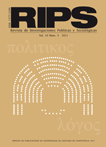Un trazado de acontecimientos: la economía política de la desposesión, el ascenso de Asia oriental y la crisis de la geocultura liberal
Contido principal do artigo
Resumo
Resumen. Este artículo tiene un doble objetivo. Por un lado, reconstruir los orígenes y dinámica de la economía política global de la coyuntura histórica vigente en la que se combinan: la belle epoque financiera del ciclo sistémico de acumulación estadounidense, el desplazamiento del núcleo de la economía global hacia Asia oriental, la disputa por la hegemonía del sistema interestatal devenido global y la disputa por otorgar sentido político a la crisis de la geocultura liberal. A partir de ese diagnóstico, se afirma que el moderno sistema mundial se encuentra ante una “crisis de príncipe” en la cual conservadores y radicales se disputan la hegemonía. El trabajo está dividido en tres partes. En primer lugar, se expone la dinámica que conformó la base material de la coyuntura histórica. En segundo lugar, se analizan las respuestas dadas por el giro conservador a la crisis de la geocultura liberal. Por último, se exponen las posibilidades de la política radical emancipatoria de hacer frente a la crisis de la geocultura liberal ante el fracaso del neoconservadurismo.
This article has a double objective. On the one hand, to reconstruct the origins and dynamics of the global political economy of the current historical conjuncture in which they combine: the financial belle epoque of the systemic cycle of American accumulation, the displacement of the core of the global economy towards East Asia, the dispute over the hegemony of the interstate system, become global and the dispute over granting political meaning to the crisis of liberal geoculture. From that diagnosis, it is affirmed that the modern world system is facing a "prince crisis" in which conservatives and radicals dispute the hegemony. This work is divided in three parts. In first place, it exposes the dynamics that conformed the material base of the historical conjuncture. Secondly, the answers given by the conservative turn to the crisis of liberal geoculture are analyzed. Finally, it exposes the possibilities of radical emancipatory politics to face the crisis of liberal geoculture after the failure of neoconservatism.







